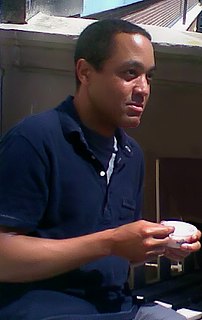A Quote by Joseph Brodsky
If what distinguishes us from other species is speech, then poetry, which is the supreme linguistic operation, is our anthropological - indeed, genetic - goal.
Related Quotes
By failing to read or listen to poets, society dooms itself to inferior modes of articulation, those of the politician, the salesman, or the charlatan. In other words, it forfeits its own evolutionary potential. For what distinguishes us from the rest of the animal kingdom is precisely the gift of speech. Poetry is not a form of entertainment and in a certain sense not even a form of art, but it is our anthropological, genetic goal. Our evolutionary, linguistic beacon.
You can imagine a different world in which a number of species developed with different genetically determined linguistic systems. It hasn't happened in evolution. What has happened is that one species has developed, and the genetic structure of this species happens to involve a variety of intricate abstract principles of linguistic organization that, therefore, necessarily constrain every language, and, in fact, create the basis for learning language as a way of organizing experience rather than constituting something learned from experience.
Its [the anthropological method] power to make us understand the roots from which our civilization has sprung, that it impresses us with the relative value of all forms of culture, and thus serves as a check to an exaggerated valuation of the standpoint of our own period, which we are only too liable to consider the ultimate goal of human evolution, thus depriving ourselves of the benefits to be gained from the teachings of other cultures and hindering an objective criticism of our own work.
An infinity of these tiny animals defoliate our plants, our trees, our fruits... they attack our houses, our fabrics, our furniture, our clothing, our furs ... He who in studying all the different species of insects that are injurious to us, would seek means of preventing them from harming us, would seek to cause them to perish, proposes for his goal important tasks indeed.
I do not share the pessimism of the age about the novel. They are one of our greatest spiritual, aesthetic and intellectual inventions. As a species it is story that distinguishes us, and one of the supreme expressions of story is the novel. Novels are not content. Nor are they are a mirror to life or an explanation of life or a guide to life. Novels are life, or they are nothing.
Is he a dread genetic determinist, or a dread environmental determinist? He is neither, of course, for both these species of bogeyman are as mythical as werewolves. By increasing the information we have about the various causes of the constraints that limit our current opportunities, he has increased our powers to avoid what we want to avoid, prevent what we want to prevent. Knowledge of the roles of our genes, and the genes of the other species around us, is not the enemy of human freedom, but one of its best friends.
My aim is to advocate that we make this mental switch in respect of our attitudes and practices towards a very large group of beings: members of species other than our own - or, as we popularly though misleadingly call them, animals. In other words, I am urging that we extend to other species the basic principle of equality that most of us recognize should be extended to all members of our own species.




































